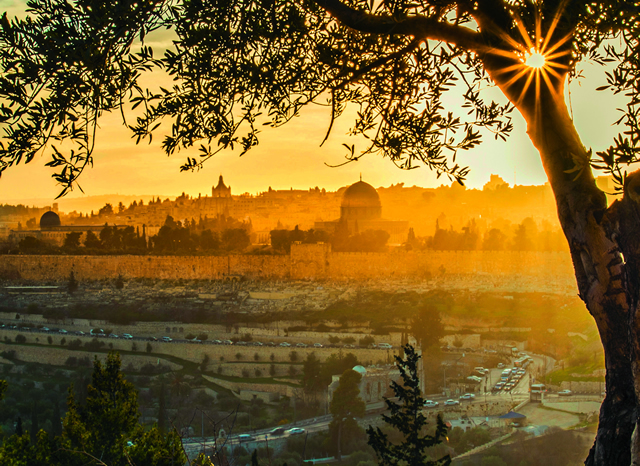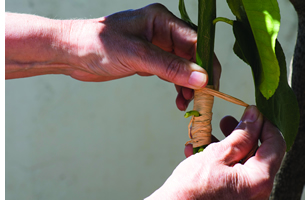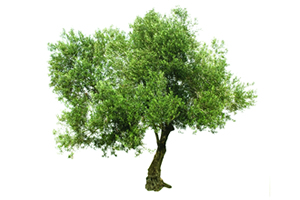
Israel, the Church, and the Nations – Part 5
Toward the conclusion of the Church Age, Israeli branches will be grafted back into the cultivated olive tree (the Church) within the re-existing State. This will happen before the Church (the body of Christ on earth) is removed and all Israel is finally saved. A redemptive-historical and prophetic interpretation of Romans 9—11.
ARGUMENTS FOR ISRAEL’S FUTURE
“For if the firstfruit be holy, the lump is also holy: and if the root be holy, so are the branches. And if some of the branches be broken off, and thou, being a wild olive tree, wert grafted in among them, and with them partakest of the root and fatness of the olive tree; Boast not against the branches. But if thou boast, thou bearest not the root, but the root thee. Thou wilt say then, The branches were broken off, that I might be grafted in. Well; because of unbelief they were broken off, and thou standest by faith. Be not highminded, but fear: For if God spared not the natural branches, take heed lest he also spare not thee” (Rom 11:16-21).
In this passage, the Apostle gives two symbolic arguments in favor of Israel’s ultimate preservation.
1. The Firstfruits – This example recalls the grain offering in the Old Testament (Num 15:17-21). The grain gift of firstfruits was consecrated to God and thus holy (that is, set apart for Him). This gift of firstfruits represents the entire harvest, making the complete harvest (and the dough that would later be made from it) sacred for use as bread. Jeremiah said of Israel, “Israel was holiness unto the LORD, and the firstfruits of his increase…” (Jer 2:3a).
2. The Olive Tree – The olive tree is a very ancient evergreen. It is my view that the firstfruits and the root refer to the patriarchs and the promises God made to them. The roots symbolize the patriarchs, and the branches the Jews at the time of Jesus up until Pentecost. The unbelieving “branches” were broken off. The believing “branches” remained and experienced Pentecost.
The Apostle John emphasizes the difference between the unbelieving and believing Jews, and the consequences of this distinction: “Whosoever denieth the Son, the same hath not the Father: he that acknowledgeth the Son hath the Father also” (1 John 2:23).
The Gentiles were grafted in in place of the broken branches (Acts 10—11). They now have a share in the “root and fatness of the olive tree.” Together with the believing Jews, they form a tree. This means the purest grace for the nations, because there are no prerequisites to be met. That is why Paul warns the nations against elevating themselves above Israel and becoming disdainful of them. He gives two arguments for this:
1. The nations don’t bear the root, but vice versa: the root carries them. The Church of Jesus, for example, was based on the faith of Abraham, who was declared righteous by it (Rom 4:3). Likewise, we too are declared righteous only by faith. And Abraham also became our spiritual father: “That is why it depends on faith, in order that the promise may rest on grace and be guaranteed to all his offspring—not only to the adherent of the law but also to the one who shares the faith of Abraham, who is the father of us all” (Rom 4:16, ESV). And, above and beyond that, the Lord Jesus is the underlying root that bears everything: “I Jesus have sent mine angel to testify unto you these things in the churches. I am the root and the offspring of David, and the bright and morning star” (Rev 22:16).
2. Rather than becoming disdainful, we should have reverence because God could break the Gentiles off again at any time. It isn’t written that He will, but it should keep us grounded that He could do so, as a form of judgment in His absolute sovereignty. As other translations put it, “neither will he spare you” or, “he will not spare you either.”
It’s worth noting that Paul isn’t addressing the individual’s relationship with God in this passage. Rather, the passage is about the places that Israel and Christianity as a whole occupy in God’s plan of salvation. Consider developments in Church history. “Boast not against the branches … Thou wilt say then, The branches were broken off, that I might be grafted in” (Rom 11:18a-19). While this may be true, it’s not a reason to get haughty. Yet this is exactly what happened. Christianity has disinherited Israel and placed itself above this people. The Church could only see itself, and trampled Israel underfoot.
Yes, the unbelieving portion of Israel has indeed been rejected as a means of salvation in the present. But the Church, the current means of salvation, has always consisted of both Jews and Gentiles. And Israel will be received again as a whole in the future.
GOD CAN
“Behold therefore the goodness and severity of God: on them which fell, severity; but toward thee, goodness, if thou continue in his goodness: otherwise thou also shall be cut off. And they also, if they abide not still in unbelief, shall be grafted in: for God is able to graft them in again. For if thou wert cut out of the olive tree which is wild by nature, and wert grafted contrary to nature into a good olive tree: how much more shall these, which be the natural branches, be grafted into their own olive tree?” (Rom 11:22-24).
God’s severity and goodness are juxtaposed. God was severe against the fallen (those who knew Him but still rejected Jesus). By contrast, those who weren’t seeking God and had no part in Him at all, experience the goodness of God’s grace. The believers from the nations need to be aware of this, so that they don’t become arrogant. If they don’t remain in this goodness, they too could be cut off again. As I said, this isn’t an admonition that someone who is born again could be lost. (Paul isn’t speaking about individuals, but of Israel and Christianity.) Rather, it’s a blanket statement of God’s ability. God can continue to graft returning Jews back into the olive tree. Paul gives a supernatural example of this.
 It isn’t natural for a wild branch to be grafted into a cultivated olive tree (v. 24). But with God, it is possible. That being the case, how much more then is He able to restore the natural branches that had previously been cut off? In this context, it’s interesting that the number of Jewish Christians in Israel has been growing steadily since the State was founded. OneForIsrael.com reported in 2018:
It isn’t natural for a wild branch to be grafted into a cultivated olive tree (v. 24). But with God, it is possible. That being the case, how much more then is He able to restore the natural branches that had previously been cut off? In this context, it’s interesting that the number of Jewish Christians in Israel has been growing steadily since the State was founded. OneForIsrael.com reported in 2018:
“Our study found that 60% of the sample are first-generation believers—they are the first in their family to believe in Yeshua. The next largest group is second-generation—their parents are also believers.” As context, the article notes that “In 1948, there were approximately ten million Jewish people around the world who had survived the Holocaust. About 600,000 were living in Israel. Of those, only 23 of them believed in Yeshua as their Messiah. There were some churches led by denominations and missionaries in Israel, but there were no Messianic congregations at all […] In 2017, 300 congregations were counted. It has become increasingly difficult to accurately identify the number of Jewish believers in Israel, but a conservative estimate is now 30,000. […] This shows that we are a young body and that the majority of growth is no longer from people immigrating or having children, but is rather due to people coming to know the Lord themselves.”
This can probably be considered a sign of the end time. Toward the conclusion of the Church Age, Israeli branches will be grafted back into the cultivated olive tree (the Church) within the re-existing State. This will happen before the Church (the body of Christ on earth) is removed and all Israel is finally saved.
Just how and when the Lord will accomplish this is shown below:
GOD WILL
“For I would not, brethren, that ye should be ignorant of this mystery, lest ye should be wise in your own conceits; that blindness in part is happened to Israel, until the fulness of the Gentiles be come in. And so all Israel shall be saved: as it is written, There shall come out of Sion the Deliverer, and shall turn away ungodliness from Jacob: For this is my covenant unto them, when I shall take away their sins. As concerning the gospel, they are enemies for your sakes: but as touching the election, they are beloved for the father’s sakes. For the gifts and calling of God are without repentance. For as ye in times past have not believed God, yet have now obtained mercy through their unbelief: Even so have these also now not believed, that through your mercy they also may obtain mercy. For God hath concluded them all in unbelief, that he might have mercy upon all” (Rom 11:25-32).
This is the climax of the exposition about God’s salvation purposes for Israel. If we called the prior section “God Can,” this one could be entitled “God Will.” He is in the process of causing more and more Jews in Israel to believe. And He’ll bring this process to completion. Paul makes five special statements about this.
1. The Mystery. – “For I would not, brethren, that ye should be ignorant of this mystery, lest ye should be wise in your own conceits; that blindness in part is happened to Israel, until the fulness of the Gentiles be come in” (v. 25). In this way, the believers from the nations are warned three times not to be haughty toward Israel (vv. 18-21, 22, 25). But what is the mystery? It was no secret that Israel was being hardened. Isaiah, the Lord Jesus, and Paul had already spoken of this (Matt 13:14-17; Isa 6:10; 29:10; 44:18; Rom 11:8). And Israel’s eventual salvation was no big secret either: the prophets had repeatedly spoken of it. No, the mystery is in the salvation of a “fullness of the Gentiles.” The question is: how long will the hardening last? When will Israel be accepted again? What needs to have happened for her to be saved?
 The answer is: God had a mysterious plan in His foreknowledge of Israel’s hardening. He wanted to form Jews and Gentiles into an olive tree, a new people. God calls people from all nations—branches from a wild olive tree (Acts 10)—and grafts them into a cultivated olive tree (Acts 2). In Acts 2, a purely Jewish church first came into being. These believing members from the people of Israel, were the branches of the olive tree whose forefathers in the faith (roots) were also Jews. Here, Jesus is the main rootstock. They formed the cultivated olive tree because of their faith. The unbelieving Jews were broken out of it (Rom 11:17). After the stoning of Stephen, from Acts 10 we see the nations are added to this olive tree, beginning with Cornelius (cf. Eph 2:13-18). The Apostle Paul, who evangelized Jews and Gentiles, was especially called to this task. The “fullness” is reached when the number from the nations, known only to God, has been added to the olive tree.
The answer is: God had a mysterious plan in His foreknowledge of Israel’s hardening. He wanted to form Jews and Gentiles into an olive tree, a new people. God calls people from all nations—branches from a wild olive tree (Acts 10)—and grafts them into a cultivated olive tree (Acts 2). In Acts 2, a purely Jewish church first came into being. These believing members from the people of Israel, were the branches of the olive tree whose forefathers in the faith (roots) were also Jews. Here, Jesus is the main rootstock. They formed the cultivated olive tree because of their faith. The unbelieving Jews were broken out of it (Rom 11:17). After the stoning of Stephen, from Acts 10 we see the nations are added to this olive tree, beginning with Cornelius (cf. Eph 2:13-18). The Apostle Paul, who evangelized Jews and Gentiles, was especially called to this task. The “fullness” is reached when the number from the nations, known only to God, has been added to the olive tree.
News from Israel - 05/2022

